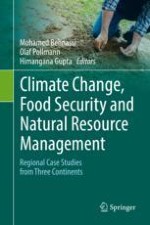
2019 | OriginalPaper | Buchkapitel
1. The Water-Energy-Food Nexus and Climate Perspective: Relevance and Implications for Policy-making and Governance
verfasst von : Mohamed Behnassi
Erschienen in: Climate Change, Food Security and Natural Resource Management
Aktivieren Sie unsere intelligente Suche, um passende Fachinhalte oder Patente zu finden.
Wählen Sie Textabschnitte aus um mit Künstlicher Intelligenz passenden Patente zu finden. powered by
Markieren Sie Textabschnitte, um KI-gestützt weitere passende Inhalte zu finden. powered by